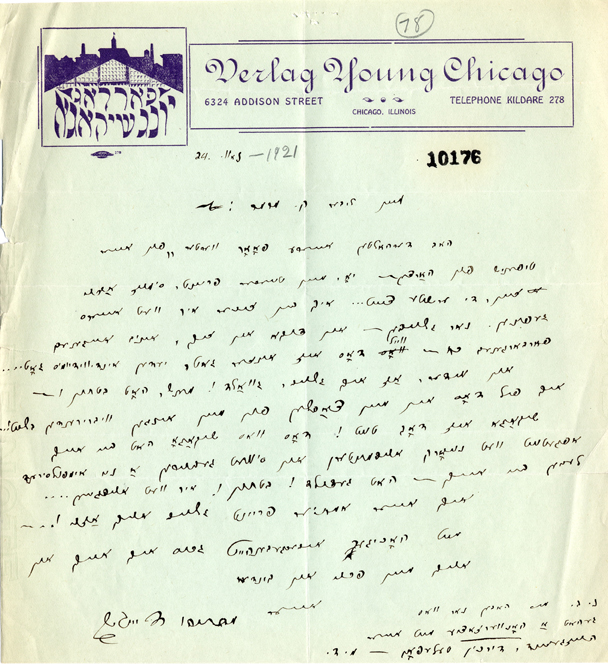Di gantse velt af a firmeblank: The World of Jewish Letterheads
Assemble the letterheads of Jewish organizations, institutions, and individuals in Europe, North and South America, and Palestine from the 1890s to the eve of World War II in 1939 and you have a portrait of the Jewish world: transnational; diverse in language, political, and religious orientation; and flourishing.
Di gantse velt af a firmeblank (The Whole World on a Letterhead) is an experiment in building that portrait. Here, we hope to bring you several times a month, a different example of letterhead from a single collection in the YIVO Archives, the Papers of Kalman Marmor.
Marmor, a Yiddish writer and cultural activist, was born October 11, 1879 in Mayshigola, Vilna Gubernia (today Maišiagala, Lithuania). In 1906, he settled in the U.S. Initially active with the Labor Zionist movement, he later became a Communist. He was an organizer of the 1937 World Yiddish Culture Congress, cultural director of the International Workers Order, and a contributor to the Communist Yiddish newspaper, Morgn Frayhayt. Between 1933 and 1936, he lived in Kiev, where he worked at the Institute of Jewish Proletarian Culture and prepared scholarly editions of the work of American Yiddish poets and writers. During Stalin’s Great Terror, the Institute was liquidated, and much of its leadership was arrested and executed. Marmor, an American citizen, returned to the U.S. He died in Los Angeles in 1956.
His papers at YIVO contain several thousand letters from the turn of the 20th century to the 1950s. He had an astonishingly diverse array of correspondents, not limited to Zionist and Communist activists.

From Matisyahu Daytsh in Chicago to Kalman Marmor, November 24, 1921. (YIVO RG 205, Folder 123)
Matisyahu Daytsh writes on the letterhead of the Yiddish publishing house, Verlag Young Chicago. The press is perhaps best-known for the collection of modern Yiddish poetry it published in 1922, Yung Shikago: a zamlung (Young Chicago: An Anthology).
This letter was written in late 1921, possibly around the time Marmor was forced out of his position as Chicago editor of the Forward because of his shift in allegiance from the Socialist Party to the Communist Party. At any rate, it is clear here that he has suffered a setback of some sort. In response to what must have been a desperate letter, Daytsh urges Marmor to take heart, “to have faith… to believe in yourself.” The belief in one’s own latent strength, he suggests, “is every individual’s God.” Chicago is “dead,” he reassures Marmor, who is soon to leave the city for New York, and his setbacks there will only provide the impetus for an invigorated start at a new life.
Series curated by Roberta Newman; Images digitized by Vital Zajka. Biographical information on Kalman Marmor from biographical note by Daniel Soyer in the inventory to RG 205, Papers of Kalman Marmor.




